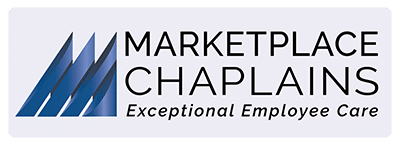Support Beyond Boxes: 5 Benefits of Having a Chaplain in Distribution Operations Workplace
 In the fast-paced world of distribution operations, where efficiency and productivity are paramount, one might not immediately associate the presence of a chaplain with streamlined logistics. However, a growing number of companies are recognizing the profound impact that a chaplaincy program can have on their distribution centers. Beyond the hustle and bustle of boxes and conveyor belts, the role of a chaplain extends far beyond traditional religious services.
In the fast-paced world of distribution operations, where efficiency and productivity are paramount, one might not immediately associate the presence of a chaplain with streamlined logistics. However, a growing number of companies are recognizing the profound impact that a chaplaincy program can have on their distribution centers. Beyond the hustle and bustle of boxes and conveyor belts, the role of a chaplain extends far beyond traditional religious services.
In this article, we will explore five significant benefits of having a chaplain in distribution operations, shedding light on the positive outcomes that extend beyond the bottom line.
1. Emotional Support in High-Stress Environments
Distribution centers can be intense environments, with employees often facing high-pressure situations and tight deadlines. The constant demand for efficiency, combined with the physical demands of the job, can take a toll on the mental well-being of workers. A chaplain, trained to provide emotional support and guidance, becomes a crucial resource in helping employees navigate the stresses of their roles.
The chaplain serves as a confidant, offering a listening ear to employees who may be dealing with personal challenges, workplace conflicts, or the general pressures of life. By fostering a culture that values the emotional well-being of its workforce, companies can create a healthier and more resilient team. This emotional support not only improves the overall work environment but also contributes to increased employee satisfaction and retention.
- Active Listening: Chaplains provide a listening ear to employees dealing with personal challenges, workplace conflicts, or job-related stress.
- Counseling Services: Offering confidential counseling sessions to help employees navigate the pressures of their roles and personal lives.
- Stress Management Workshops: Conducting workshops to equip employees with tools and techniques for managing stress in a high-pressure environment.
2. Building a Stronger Sense of Community
Distribution centers often consist of diverse teams, comprising individuals from various backgrounds and cultures. In such environments, creating a sense of community can be challenging. A chaplain, by offering spiritual and emotional guidance, plays a vital role in building bridges between individuals who may not have much in common.
Chaplaincy programs are inclusive and respect the diversity of beliefs within the workforce. Their presence and commitment to conversing with employees no matter what their background, can positively influence the culture. This sense of community fosters teamwork and collaboration, creating a more harmonious workplace. In turn, a united and supportive workforce can significantly enhance productivity and contribute to the overall success of the distribution operation.
- Inclusive Environment: Chaplaincy programs respect and embrace the diversity of beliefs within the workforce, creating an inclusive environment.
- Community-Building Activities and Training: Chaplains can present a WorkLife Growth topic at a Lunch and Learn periodically to bring employees together to communicate.
3. Conflict Resolution
In any workplace, conflicts are inevitable. In a distribution center, where the pace is fast and tensions can run high, having a trained chaplain on-site can be a game-changer for conflict resolution. Chaplains are skilled in mediation and conflict resolution techniques, offering employees a neutral and confidential avenue to address their issues.
By providing a safe space for open communication, a chaplain can help resolve conflicts by encouraging an employee to communicate with someone they are having a conflict with, preventing disruptions to workflow, and maintaining a positive work environment. This proactive approach to conflict resolution not only improves employee satisfaction but also contributes to the overall efficiency of the distribution operation.
- Neutral Mediation: Serving as a neutral third party that does not interfere or get between the two people dealing with a conflict. They do not take sides, creating a safe space for employees to go for any issue.
- Conflict Prevention: Proactively addressing workplace tensions personally, to prevent conflicts from escalating and disrupting workflow.
4. Crisis Intervention and Support
Distribution operations may face unexpected challenges, ranging from natural disasters to workplace accidents. During times of crisis, the presence of a chaplain becomes even more critical. Chaplains are trained to provide immediate support and comfort to individuals facing trauma or grief.
In the aftermath of a crisis, the chaplaincy program becomes a resource for employees to cope with the emotional aftermath. Whether it’s providing counseling, organizing support groups, or assisting in memorial services, chaplains contribute to the healing process and help the workforce navigate through difficult times. This level of support not only aids in the emotional recovery of employees but also demonstrates the company’s commitment to the well-being of its staff.
- Immediate Support: Providing immediate emotional support to individuals facing trauma or grief during and after crises.
- Counseling Services: Offering counseling services for employees dealing with the aftermath of a crisis, ensuring a healthy emotional recovery.
- Support Groups: Organizing support groups to allow employees to share experiences and support each other through difficult times.
5. Enhancing Employee Engagement and Satisfaction
A distribution center with a chaplaincy program sends a powerful message to its employees: they are valued not only as workers but as individuals with unique needs and concerns. This sense of care and consideration translates into higher levels of employee engagement and satisfaction.
Employees who feel supported and heard are more likely to be motivated, dedicated, and loyal to their employer. The presence of a chaplain contributes to a positive company culture, reinforcing that the organization is invested in the holistic well-being of its workforce. As a result, employees are more likely to go the extra mile, leading to increased productivity and overall operational success.
- Holistic Well-Being: Acknowledging and addressing the holistic needs of employees, demonstrating a commitment to their well-being.
- Positive Company Culture: Contributing to positive workplace culture by fostering an environment where employees feel cared for and valued.
- Motivational Workshops: Conducting workshops and sessions to motivate employees, boosting their dedication and loyalty to the organization.
Expanding the Scope: Additional Benefits of Chaplaincy in Distribution Operations
Providing Professional Development Support
Chaplains, in their unique role, can extend support not only in personal matters but also in matters of professional development. Many distribution centers use chaplains as resources for mentorship and guidance, helping employees navigate their career paths within the organization. By offering a confidential space for discussing career aspirations, challenges, and growth opportunities, chaplains become valuable partners in fostering the professional development of the workforce.
Furthermore, chaplains can organize workshops and seminars on topics such as stress management, time management, and effective communication. This additional layer of support enhances employees’ skill sets, making them more resilient and adaptable in the face of challenges, ultimately benefiting the distribution operation as a whole.
Chaplains Improving Workplace Morale
High morale is a driving force behind productivity and team cohesion. Chaplains contribute significantly to boosting workplace morale by fostering a positive and supportive atmosphere. Through regular check-ins, informal conversations, and team-building activities, chaplains can gauge the pulse of the workforce and address any emerging issues before they become major concerns.
Additionally, chaplains may participate in employee recognition programs. Recognizing and celebrating achievements, both big and small, creates a culture of appreciation and motivates employees to consistently perform at their best. In turn, this positive morale has a cascading effect on the overall atmosphere of the distribution center, promoting a culture of collaboration and shared success.
Strengthening Corporate Social Responsibility
In an era where corporate social responsibility (CSR) is increasingly important, the presence of a chaplaincy program in distribution operations can be aligned with the company’s commitment to social and ethical values. Chaplains often engage in community outreach programs, connecting the distribution center with local charities, nonprofits, and community initiatives.
Through these partnerships, employees have the opportunity to participate in volunteer activities, fostering a sense of pride and fulfillment beyond their daily work responsibilities. Such initiatives not only contribute to the betterment of the community but also enhance the company’s reputation as a socially responsible organization. Employees who are proud of their company’s commitment to social causes are likely to be more engaged and dedicated to their work.
Fostering Workplace Diversity and Company Inclusion
Distribution operations often bring together individuals from diverse backgrounds, cultures, and beliefs. A chaplaincy program can play a pivotal role in fostering an inclusive environment where all employees feel respected and valued. Chaplains are trained to navigate conversations about diversity and inclusion, promoting understanding and empathy among team members.
Chaplains can contribute to a workplace where differences are celebrated rather than tolerated. This inclusive approach not only improves interpersonal relationships but also has a positive impact on productivity and creativity. An inclusive distribution center is better equipped to adapt to the evolving needs of the market and to find innovative solutions to complex challenges.
Conclusion
In conclusion, the benefits of having a chaplain in distribution operations extend far beyond the conventional boundaries of religious services. Emotional support, community building, conflict resolution, crisis intervention, and enhanced employee engagement are just a few of the invaluable contributions that a chaplaincy program can make to the success of a distribution center.
As companies strive to create healthier and more inclusive workplaces, the role of a chaplain becomes increasingly relevant. By acknowledging the holistic needs of their workforce, distribution operations can create a positive and resilient environment that not only benefits employees individually but also contributes to the overall success and sustainability of the business. In the dynamic landscape of distribution operations, the presence of a chaplain team emerges as a beacon of support, fostering a workplace culture that goes beyond boxes and prioritizes the well-being of the people behind the distribution process.







